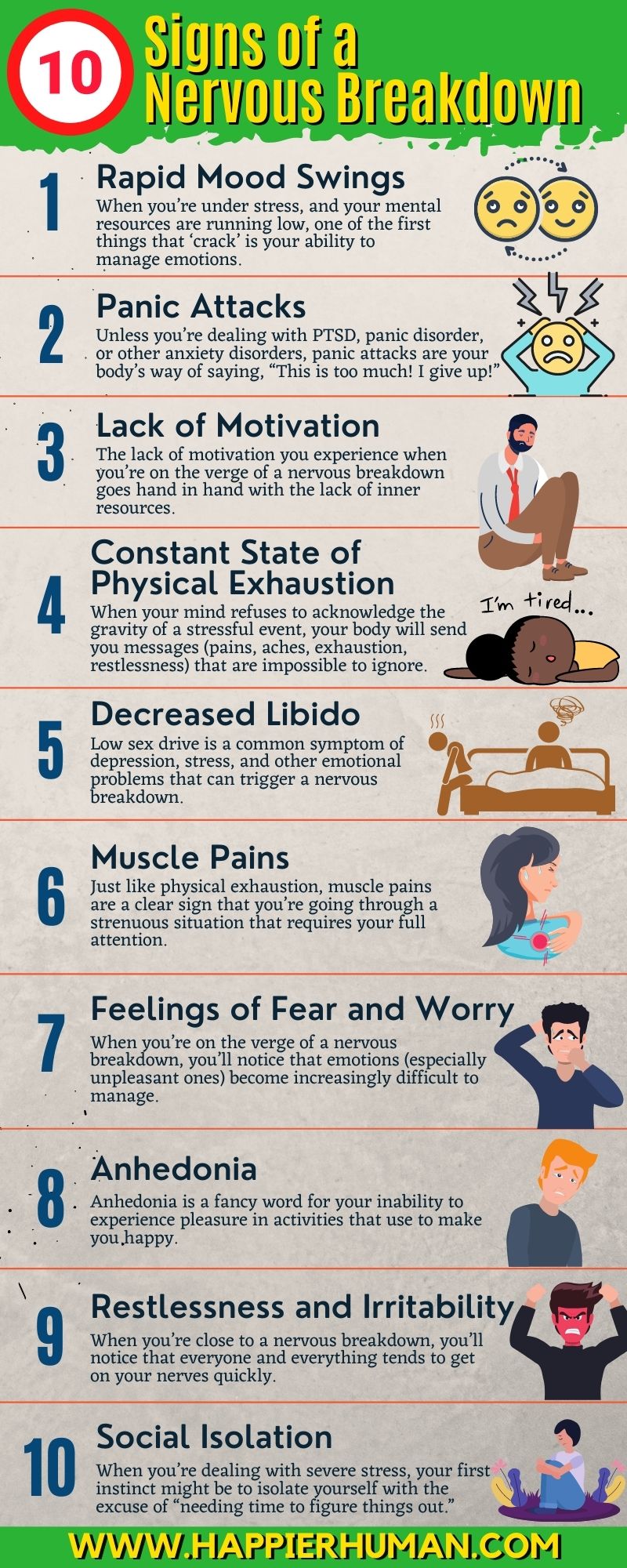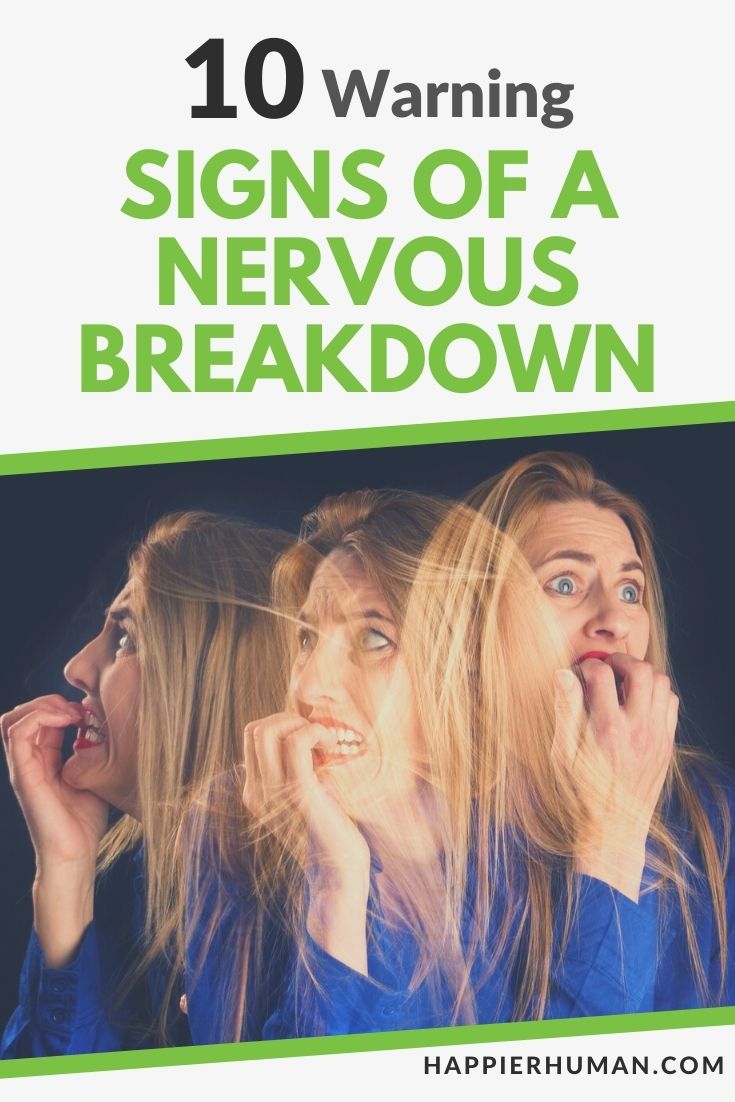Over the last year, I’ve noticed an increase in the number of people who come to my office burned out or on the verge of a nervous breakdown.
Part of the reason might be the two years of isolation and remote work that have stretched our mental resources to the limit.
But given that people were experiencing nervous breakdowns even before the pandemic, it’s safe to assume that underneath this unpleasant reaction is a whole range of emotional vulnerabilities.
To help you avoid reaching a breaking point that can throw you off course, allow me to share a few telltale signs of a nervous breakdown, along with a list of practices that boost emotional resilience.
What is a Nervous Breakdown?
In general, we use the term ‘nervous breakdown’ to describe a situation that exceeds our ability to cope and drains our mental resources.
A nervous breakdown can be a considerable obstacle preventing you from carrying out your daily activities (work, school, social interactions) and making its presence felt when certain events become overwhelming physically and emotionally.
Although this term has been used frequently in the past to cover various mental and emotional disorders [1], today’s mental health professionals rarely use it.
‘Nervous breakdown’ is neither a medical term nor does it indicate a specific mental illness. In other words, it’s not a condition in itself but the consequence of an underlying vulnerability such as depression, anxiety, or burnout.
Even though there’s no straightforward procedure for diagnosing nervous breakdowns, it never hurts to talk to someone.
A health professional can help you identify the factors that cause or contribute to your nervous breakdown by asking questions about symptoms, performing a physical examination, and reviewing your medical history.
What Causes Nervous Breakdowns?
Among the events that generate enough stress to trigger a nervous breakdown are:
10 Signs You’re on the Verge of a Nervous Breakdown
Because they’re not associated with any specific condition, nervous breakdowns have no definite symptoms. However, the common signs of a nervous breakdown are physical and mental, varying from one person to another.
1. Rapid Mood Swings
When you’re under stress, and your mental resources are running low, one of the first things that ‘crack’ is your ability to manage emotions.
Even the slightest discomfort is enough to make you irritable and moody. In other words, you exaggerate the gravity of a situation and find it almost impossible to keep unpleasant emotions like frustration and anger under control.
And that’s how you end up shouting because the driver in front of you is moving too slow; or making a scene simply because the barista forgot to put caramel in your latte.
2. Panic Attacks
Unless you’re dealing with PTSD, panic disorder, or other anxiety disorders, panic attacks are your body’s way of saying, “This is too much! I give up!”
It’s what happens when you ignore other signs like headaches, migraines, or physical exhaustion, and choose to push on despite having little mental and physical resources to keep you going.
Long story short, the panic attacks you might experience when navigating a challenging period are like a forced shutdown, preventing you from reaching total burnout.
3. Lack of Motivation
The lack of motivation you experience when you’re on the verge of a nervous breakdown goes hand in hand with the lack of inner resources.
Keep in mind that motivation requires more than just sheer willpower.

When you’re dealing with a situation that drains you (physically, mentally, and emotionally), even the slightest effort feels like an arduous task.
You barely have enough energy to ‘survive’ the situation that’s causing you to stress, let alone focus on other responsibilities.
4. Constant State of Physical Exhaustion
Physical exhaustion is probably the most common indicator of an imminent nervous breakdown.
When your mind refuses to acknowledge the gravity of a stressful event, your body will send you messages (pains, aches, exhaustion, restlessness) that are impossible to ignore.
If you’ve been feeling tired (physically) for a couple of weeks, perhaps it’s time to consult a medical professional. Either you’re dealing with a medical condition, or you’re under a lot of pressure and in urgent need of stress relievers.
5. Decreased Libido
Low sex drive is a common symptom of depression, stress, and other emotional problems that can trigger a nervous breakdown.
Even though sex can be a fun way to relieve stress and generate positive emotional experiences, the same situation/event that’s pushing you on the edge of a nervous breakdown can prevent you from enjoying the physical and mental benefits of sex.
And the worst part is that low sex drive doesn’t just affect your overall mood but also the quality of your relationship/marriage.
6. Muscle Pains
Just like physical exhaustion, muscle pains are a clear sign that you’re going through a strenuous situation that requires your full attention.
Whether these pains are caused by excessive work, lack of self-care, a chaotic lifestyle, or an emotional shock, it’s vital to take some time off and focus on replenishing your inner resources.
7. Feelings of Fear and Worry
When you’re on the verge of a nervous breakdown, you’ll notice that emotions (especially unpleasant ones) become increasingly difficult to manage.
All those fears, doubts, worries that were lurking somewhere in the back of your mind suddenly rise to the surface, altering your perspective and clouding your judgment.
Perhaps you don’t notice them throughout the day because you’re too busy focusing on the situation that’s causing you stress.
But when you go to bed and your mind isn’t distracted by anything, you might feel overwhelmed by irrational thoughts, catastrophic scenarios, and a critical inner voice that ‘suffocates’ the little hope you have for a better future.
8. Anhedonia
Anhedonia is a fancy word for your inability to experience pleasure in activities that use to make you happy.
Although anhedonia is a common symptom of depression, it could also indicate that something has gone wrong, and you need to change something to avoid a nervous breakdown.
Sometimes, it’s ok to ‘force’ yourself a little and engage in activities that used to bring you joy, even if you don’t feel like doing anything.
9. Restlessness and Irritability
When you’re close to a nervous breakdown, you’ll notice that everyone and everything tends to get on your nerves quickly.
On top of that, you experience a constant state of mental (sometimes even physical) restlessness, like something horrible is about to happen,
Unfortunately, if you keep ignoring the signs, something terrible will, in fact, happen.
And I’m not referring to the worry-filled scenarios that are going through your head, but the nervous breakdown that awaits you if you insist on running on an empty tank.
10. Social Isolation
When you’re dealing with severe stress, your first instinct might be to isolate yourself with the excuse of “needing time to figure things out.”

But what you’re doing is cutting yourself off from people who might be able to help you transition whatever is causing you stress and anxiety.
Although you might feel like you don’t have the time and energy to socialize, keep in mind that connecting with other people helps you manage difficult emotions and replenishes your inner resources.
How to Avoid a Nervous Breakdown
In essence, avoiding a nervous breakdown is a matter of self-care and emotional resilience.
On the one hand, it’s vital to focus on activities and practices that help you unwind and keep stress under control.
On the other hand, you need to build a certain level of mental and emotional stability that allows you to navigate life’s unexpected difficulties with ease.
Manage Your Inner Resources
Throughout this article, I’ve mentioned the term ‘inner resources’ several times.
But what does it mean to have inner resources?
An inner resource can be anything that helps you get through challenging situations, plus your overall level of energy.
One example of an inner resource is perseverance, the ability to overcome failure after failure and keep trying until you succeed.
Another example is patience, the ability to tolerate frustration, keep your impulses under control, and wait for the right opportunity.
One way to manage your inner resources is by discovering your strengths.
That way, you will gain the confidence to overcome whatever stressful situation life throws down your path, knowing you have a set of abilities and skills that can work in your favor.
Another way to manage your inner resources – specifically your overall energy level – is by making sure you get plenty of exercise, quality sleep, and healthy food.
Although what I said earlier may sound like a cliché, it’s vital to understand that the more you take care of your body, the better your brain (and mind) works.
Finally, I believe meditation can drastically improve your ability to handle emotions and help you prevent nervous breakdowns.
Long story short, managing your inner resources boils down to taking care of yourself, so that you don’t end up running on an empty tank.
Adjust Your Standards and Expectations
Sometimes, the main reason you’re dealing with so much stress that you find yourself on the edge of a nervous breakdown is your impossible standards and expectations.
Allow me to elaborate.
In theory, we all want to set daring goals, deliver impressive results, and achieve great things.
However, there might be a significant discrepancy between what you want to achieve and what you can (realistically) achieve. And that’s because you have less control over various life events than you think you have.
Even when you pursue the goals that you (and no one else) set up, there’s no telling how the process of achieving them might unfold.
Sometimes, you pour all our resources (financial, emotional, mental) into something that you desire, only to discover that you’ve ‘bitten more than you could chew.’
And if you ignore this harsh reality and choose to push forward (without changing your approach), there’s a good chance you’re heading for a nervous breakdown.
To avoid this unpleasant scenario, you need to take a break and ask yourself: Are my standards and expectations realistic?
Instead of setting unrealistically high standards that are bound to end in failure, focus on pursuing small victories that are achievable and don’t drain you to the point of exhaustion.
In the end, cultivating a happy and fulfilling life is like running a marathon. That means small but consistent effort.

Sometimes, Ignorance is Bliss.
One of the reasons why you might end up dealing with nervous breakdowns is that you care too much.
Maybe you’re the kind of person who wants to make sure that everyone at a party is feeling good.
Maybe you’re so concerned about how others see you that you’re willing to jump through hoops just to gain their approval.
Or maybe you’re constantly ‘walking on eggshells’ around your life partner because you don’t want him/her to dump you.
As you can imagine, all this effort takes a toll on your mental and emotional well-being. Furthermore, when others’ feelings are your number one priority, you end up neglecting your needs.
Long story short, this combination of people-pleasing and lack of self-care is the perfect recipe for a nervous breakdown.
What I want you to remember is that sometimes, it’s perfectly ok to put your needs first, learn to say no, and keep a healthy distance from people who take without giving anything in return.
Being this way doesn’t make you a selfish individual, but a person who values and respects his/her needs, desires, and aspirations.
Final Thoughts on Signs of a Nervous Breakdown
A nervous breakdown can indicate many underlying conditions such as acute stress disorder, PTSD, panic disorder, and depression.
It can also result from a challenging, stressful, even traumatic event that you have faced in the recent past.
Although experts have yet to establish the clinical profile of nervous breakdowns, there are plenty of signs that you can look for to avoid a mental and emotional collapse.
On the one hand, we have physical symptoms like:
On the other hand, we have psychological symptoms like:
The best way to get to the bottom of the problem and prevent a nervous breakdown is by consulting a professional who can assess your condition and determine the appropriate course of action.
For more resources to help you take better care of your mental health, check out these blog posts:
- 7 Warning Signs That You Need a Mental Health Break
- 7 Best Mental Health Apps
- 11 Benefits of Journaling on Happiness & Mental Health
References
[1] M. Barke, R. Fribush and P. N. Stearns, “Nervous Breakdown in 20th-Century American Culture,” Journal of Social History, vol. 33, no. 3, pp. 565-584, 2000.
[2] F. Chirico, “Adjustment Disorders in DSM-5: Implications for Occupational Health Surveillance,” Acta Psychopatologica, 2015.

Alexander Draghici is a licensed Clinical Psychologist, CBT practitioner, and content writer for various mental health websites. His work focuses mainly on strategies designed to help people manage and prevent two of the most common emotional problems – anxiety and depression.
Finally, if you want to increase your happiness and life satisfaction, then watch this free video that details the 7-minute habit for planning your day to focus on what's important.


